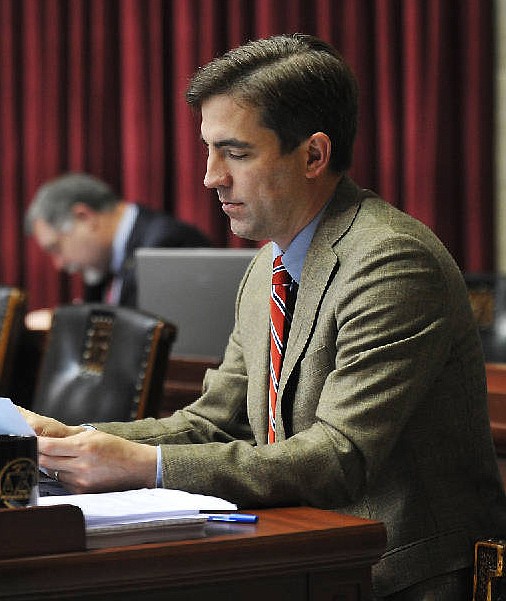State Rep. Jay Barnes wasn't surprised by State Auditor Nicole Galloway's finding last week that Missouri's tax credit programs may be creating future financial troubles for Missouri government.
In a 41-page report released Wednesday, Galloway said total tax credit redemptions have increased an average of 2.8 percent per year over the past decade and have exceeded $500 million every year since 2009.
Galloway's audit also reported tax credits that have been authorized or issued in previous years - but haven't been redeemed - have resulted in significant liabilities worth about $3 billion as of June 30, 2016, according to Department of Economic Development data.
"This is not surprising and shows a few things," Barnes, R-Jefferson City, told the News Tribune. "First, many credits do not deliver as advertised.
"Second, they have a long tail - impacting the budget up to 10 years or more after their initial authorization."
But Barnes doesn't think Galloway's report will have any immediate impact on lawmakers.
"And I don't mean that as a slight," he said. "Auditor (Tom) Schweich issued similar reports that did not move the issue."
Former Gov. Jay Nixon appointed Galloway, a Democrat, to complete Schweich's four-year term after Schweich, a Republican, committed suicide in February 2015.
And Schweich's predecessor, Democrat Susan Montee, also raised tax credit questions.
In April 2010, Montee said Missouri lawmakers often don't have enough information to predict or determine how well tax credits will work.
Galloway's report last week reminded lawmakers: "Problems noted in previous audits continue to persist regarding the design of several high-cost tax credit programs that create concerns about the cost effectiveness and efficiency of the credits.
"Prior concerns also continue to exist regarding entitlement programs that award credits non-competitively, programs that have no funding limits or unclear funding limits, and programs that do not have sunset provisions."
It seems clear discussing tax credit pros and cons isn't a new thing at the Capitol.
On April 21, 2010, Nixon staged a news conference - in the hallway in front of the governor's Capitol office - and urged lawmakers to pass tax credit reform measures before the end of the 2010 General Assembly session.
"Over the last 10 years, the use of state tax credits has ballooned to $585 million a year - that's an 86 percent growth," Nixon told reporters at that 2010 news conference. "We're not saying we don't like using economic development tools to create jobs.
"But we need to make sure that we are balancing what our expenditures are and ranking those appropriately."
Montee's report was released a few days later.
Shortly after taking office in January, Gov. Eric Greitens, a Republican, issued an executive order creating a 10-member "Committee for Simple, Fair, and Low Taxes" to study tax credits.
His order said the committee's goals included:
Comparing Missouri's tax credit programs and its tax rates with those of its peer states.
Assessing the economic impact of existing state tax credit programs.
Assessing the possibility of financing cuts to overall state tax rates, using cuts to tax credit programs.
Recommending comprehensive tax reform legislation to the governor, no later than June 30.
State Sen. Mike Kehoe, R-Jefferson City, told the News Tribune on Friday he appreciates Greitens' "leadership on this matter, appointing a commission to examine Missouri's tax credit programs, and I look forward to reading the commission's report and recommendations as soon as they are published."
Senate President Pro Tem Ron Richard, R-Joplin, said Saturday he also is waiting for the commission's report, to see the newest information and suggestions.
Richard was the House speaker in 2010 - and said then "Montee and Nixon are playing a dangerous and damaging political game creating a fictitious conflict between education and Missouri jobs. The Missouri House will continue to protect responsible economic development programs that create those jobs."
Richard also said in 2010, tax credits help the state create the jobs that ultimately will help pay for Missouri's needs, including education.
He also predicted legislative leaders could adjust tax credits "in a common sense way."
Former Sen. Charlie Shields, R-St. Joseph - who now is president and CEO of Truman Medical Centers, Kansas City, and also is president of the State Board of Education - was Senate president pro tem in 2010.
He said seven years ago tax credit reforms faced trouble then because different lawmakers had different ideas of what those reforms should be.
Kehoe said Friday: "I am a proponent of tax credits that bring a real, tangible return to the state of Missouri.
"Accordingly, I am also a proponent of thoroughly examining every tax credit program to ensure that Missourians are getting a return on their investment."
Barnes said: "I am hopeful that the strong leadership by Gov. Greitens - and a growing recognition by the General Assembly that Missouri could do much better with broad tax reforms that benefit all Missourians - will hopefully make a difference next year."
Schweich's 2014 audits on Historic Preservation and Low Income Housing tax credits, and Galloway's report last week, contained the same concerns Nixon had in 2010 - they involve large portions of the state's tax credits, but they're inefficient.
Galloway reported last week: "No legislative changes have been made to the programs to incorporate any of those options.
"Improving efficiency of the tax credit programs would increase the proportions of the tax credits actually applied to the purpose of the credits, thereby providing a higher return on the state's investment."

